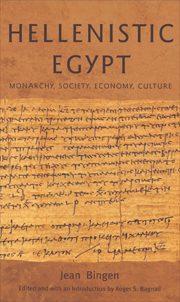Book contents
- Frontmatter
- Contents
- Original Sources of Chapters
- List of illustrations
- Glossary
- Maps
- Foreword
- Introduction: Jean Bingen and the currents of Ptolemaic history
- Part I The Monarchy
- Part II The Greeks
- Part III The Royal Economy
- 13 The Revenue Laws Papyrus: Greek tradition and Hellenistic adaptation
- 14 The structural tensions of Ptolemaic society
- 15 The third-century land-leases from Tholthis
- Part IV Greeks and Egyptians
- Conclusion
- Bibliography
- General index
- Index of passages discussed
- HELLENISTIC CULTURE AND SOCIETY
13 - The Revenue Laws Papyrus: Greek tradition and Hellenistic adaptation
from Part III - The Royal Economy
- Frontmatter
- Contents
- Original Sources of Chapters
- List of illustrations
- Glossary
- Maps
- Foreword
- Introduction: Jean Bingen and the currents of Ptolemaic history
- Part I The Monarchy
- Part II The Greeks
- Part III The Royal Economy
- 13 The Revenue Laws Papyrus: Greek tradition and Hellenistic adaptation
- 14 The structural tensions of Ptolemaic society
- 15 The third-century land-leases from Tholthis
- Part IV Greeks and Egyptians
- Conclusion
- Bibliography
- General index
- Index of passages discussed
- HELLENISTIC CULTURE AND SOCIETY
Summary
I do not mean to suggest that the ancients were like Monsieur Jourdain in Moliére, who spoke prose without knowing it, but that in fact they lacked the idea of an ‘economy’ and, a fortiori, the conceptual elements that together constitute what we call the ‘economy’.
Moses I. Finley, The Ancient Economy (1973: 21)For a millennium, from Alexander the Great to the Arab conquest, a Greek-speaking population played a determining role in Alexandria and in Egypt in the administration and the economy of the country. It developed in Egypt, on a socio-cultural level, the pattern of a privileged minority which continued to practise, with more or less distinctiveness, the language and cultural heritage which defined the group. Thanks to this Greek presence and to the dryness of the climate of Middle and Upper Egypt, for more than a century we have had available to us a large number of Greek and Latin documents on papyrus. It is one of the tasks of papyrology to make this documentation, of infinite variety and richness, known to others. But – and this is the foundation of all documentary criticism – attempts at interpretation need to be carried out with a two-fold spirit; first generalising, extrapolating the information provided by the documents, as far as possible; but at the same time, being as conscious as possible of the limits that must be set on the meaningfulness of an isolated text in a very fragmentary documentation.
- Type
- Chapter
- Information
- Hellenistic EgyptMonarchy, Society, Economy, Culture, pp. 157 - 188Publisher: Edinburgh University PressPrint publication year: 2007



